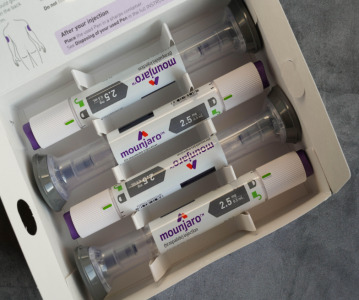European Commission Approves Amgen's New Cholesterol-Lowering Medication Repatha (Evolocumab)

The European Commission (EC) has granted marketing authorization for Amgen's Repatha (evolocumab), the first proprotein convertase subtilisin/kexin type 9 (PCSK9) inhibitor to be approved in the world, for the treatment of patients with uncontrolled cholesterol who require additional intensive low-density lipoprotein cholesterol (LDL-C) reduction.
Repatha is a human monoclonal antibody that inhibits PCSK9, a protein that reduces the liver's ability to remove LDL-C, or 'bad' cholesterol, from the blood. Elevated LDL-C is an abnormality of cholesterol and/or fats in the blood and is recognized as a major risk factor for cardiovascular disease (CVD).
The EC approved Repatha for
• The treatment of adults with primary hypercholesterolemia (heterozygous familial and non-familial [HeFH]) or mixed dyslipidemia, as an adjunct to diet:
• in combination with a statin or statin with other lipid-lowering therapies in patients unable to reach LDL-C goals with the maximum tolerated dose of a statin, or
• alone or in combination with other lipid-lowering therapies in patients who are statin-intolerant, or for whom a statin is contraindicated.
• The treatment of adults and adolescents aged 12 years and over with homozygous familial hypercholesterolemia (HoFH) in combination with other lipid-lowering therapies.
The effect of Repatha on cardiovascular morbidity and mortality has not yet been determined.
More than 60% of high-risk patients in Europe are still unable to adequately lower their LDL-C levels with statins or other currently approved lipid-lowering agents. Among very high-risk patients, the percentage is increased to more than 80%. The health care cost of CVD in the EU is approximately €106 billion per year.
"We are proud that our cholesterol-lowering medication, Repatha, is the first PCSK9 inhibitor to be approved by any regulatory agency in the world," said Sean E. Harper, executive vice president of Research and Development at Amgen. "High LDL cholesterol is a major global health burden and many patients are unable to appropriately control their LDL cholesterol with the maximum tolerated dose of a statin, or are unable to take statins due to intolerance or contraindications. We are excited to make this new cholesterol-lowering medication available for patients in Europe."
One high-risk patient group includes those with familial hypercholesterolemia (FH), an inherited condition caused by genetic mutations which lead to high levels of LDL-C at an early age. It is estimated that less than 1% of people with FH (heterozygous and homozygous forms) in most countries are diagnosed.
"Many patients who are taking cholesterol-lowering therapies, including those with familial hypercholesterolemia, still struggle to control their LDL cholesterol levels," said John J.P. Kastelein, professor of medicine and chairman of the Department of Vascular Medicine at the Academic Medical Center (AMC) of the University of Amsterdam. "As the first in a new class of drugs in the EU, evolocumab will offer physicians an important and innovative treatment option for patients with uncontrolled cholesterol who require additional LDL cholesterol reduction."
Approval from the EC grants a centralized marketing authorization with unified labeling in the 28 countries that are members of the EU. Norway, Iceland and Liechtenstein, as members of the European Economic Area (EEA), will take corresponding decisions on the basis of the decision of the EC.
Related News
-
News The next 15 drugs up for negotiation with Medicare include several blockbusters
By now, everyone is quite familiar with the drug price negotiations taking place between drug companies and the Centres for Medicare & Medicaid Services (CMS) in the USA as part of measures being taken to reduce the cost of drugs for patients, to make ... -
News PSCI Welcomes Delpharm, Samsung Biologics, and Suven as First Supplier Partners
The pharmaceutical industry continues to evolve with an increasing focus on responsible sourcing, sustainability, and collaboration across the supply chain. Under a new model to recognise suppliers within the pharmaceutical and healthcare industry that... -
News Drug prices agreed upon as part of the US Inflation Reduction Act
The Inflation Reduction Act brought into constitution by the Biden administation in 2022, which proposed a drug price negotiation between the government and pharmaceutical companies, has reached it's first agreement. -
News Eisai Alzheimer’s drug authorised in UK but still faces obstacles
In partnership with BioArctic AB, pharmaceutical company Eisai has been granted Marketing Authorisation by the Medicines and Healthcare products Regulatory Agency (MHRA) for its Alzheimer’s disease drug product Leqembi. -
News Eli Lilly's weight loss drugs removed from the FDA's shortage list
The US FDA have recently updated their drug shortage list. The recently released list shows that all dosage forms of Eli Lilly's weight-loss drug Zepbound and their diabetes drug Mounjaro are now available. -
News Global advancements in the diagnosis and treatment of rare diseases: Rare Disease Day 2024
Rare Diseases Day is celebrated on the 29th February 2024 and represents the plight of rare disease patients to gain diagnosis and access to suitable treatment. -
News Pharmaceutical industry supports COP28 health stance in joint statement
As COP28 takes place over this week in Dubai, UAE, several bodies in the pharmaceutical and health industries have come together to announce support of key movements in sustainability in the sector, and to recognise sustainability as a health issue.&nb... -
News Biden backs Cold-War measures to shore-up medical supply chains
In a recent strategy to combat rising inflation and the cost of living crisis, President Joe Biden has invoked a Cold War-era act to increase investment in a selection of medicines and supplies.
Recently Visited
Position your company at the heart of the global Pharma industry with a CPHI Online membership
-
Your products and solutions visible to thousands of visitors within the largest Pharma marketplace
-
Generate high-quality, engaged leads for your business, all year round
-
Promote your business as the industry’s thought-leader by hosting your reports, brochures and videos within your profile
-
Your company’s profile boosted at all participating CPHI events
-
An easy-to-use platform with a detailed dashboard showing your leads and performance



.png)



